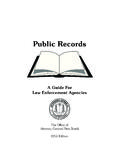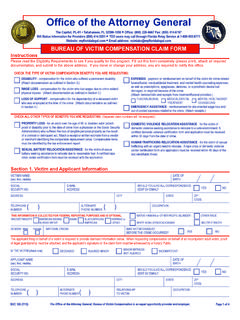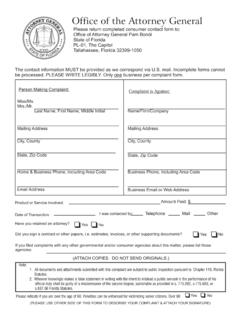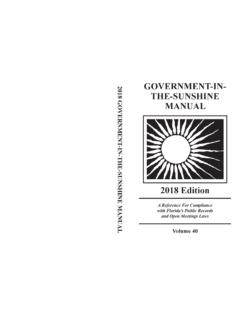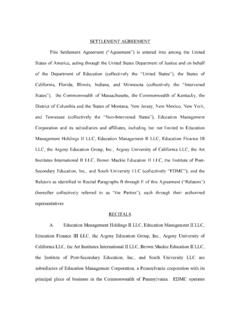Transcription of Public Records - myfloridalegal.com
1 Public Records A Guide For Law enforcement agencies The Office of Attorney General Pam Bondi 2018 Edition A MESSAGE FROM ATTORNEY GENERAL. PAM BONDI. Law enforcement agencies face many challenges in carrying out their important responsibilities to investigate crimes and to secure the arrest and prosecution of those responsible for committing unlawful acts. In addition, criminal justice agencies have unique issues that arise under the Public Records Act. The Public Records Guide for Law enforcement agencies is designed to address these special concerns. We are pleased, therefore, to present the 2018 edition of the Guide. This publication incorporates legislative changes through the 2017 legislative session and key court decisions and Attorney General Legal Opinions affecting the Public Records Act and law enforcement agencies .
2 As in the past, the Guide is intended to be used in conjunction with the law enforcement agency's legal counsel, whose advice should be sought on specific issues facing the agency. A more comprehensive analysis of the open government laws is contained in the Government in the Sunshine Manual. The Manual is prepared by the Attorney General's Office and published by the First Amendment Foundation. Information on how to obtain the Manual is available by contacting the First Amendment Foundation at (850) 224-4555. An electronic edition of the Sunshine Manual is available at the Office of the Attorney General's website at i ii TABLE OF CONTENTS. TABLE OF CONTENTS .. iii A. SCOPE OF THE Public Records ACT .. 1. 1. Statutory definition .. 1. 2. Drafts .. 2.
3 3. Electronic and computer Records .. 3. a. Electronic databases and files .. 3. b. E-Mail .. 3. c. Facebook .. 4. d. Text 4. 4. Records made or received in connection with official business .. 5. B. agencies SUBJECT TO THE Public . Records ACT .. 5. C. APPLICATION OF THE Public Records ACT. TO SPECIFIC Records .. 6. 1. Arrest and crime reports and the exemption for active criminal investigative and intelligence information .. 6. 2. Autopsy 19. 3. Baker Act reports prepared by law enforcement officers .. 20. 4. Bank account, debit and credit card numbers ..21. 5. 21. 6. Body camera recordings .. 22. 7. Confessions .. 22. 8. Confidential informants .. 22. 9. Crime victim information .. 24. 10. Criminal history information .. 30. 11. Criminal Justice Standards and Training Commission (CJSTC).
4 33. iii 12. Emergency Records .. 33. 13. Fingerprint Records .. 36. 14. Forensic behavioral mental health evaluations .. 36. 15. Juvenile offender Records .. 36. 16. Litigation Records .. 41. 17. Medical and patient Records .. 44. 18. Motor vehicle Records .. 45. 19. Pawnbroker Records .. 47. 20. Personnel Records .. 48. a. Annuity or custodial account activities .. 50. b. Applications for employment, references, and resumes .. 50. c. Complaints .. 50. d. Deferred compensation .. 54. e. Direct deposit .. 54. f. Drug test results .. 55. g. Employee assistance program .. 55. h. Evaluations of employee 55. i. Examination questions and answer sheets .. 56. j. Home addresses, telephone numbers, photographs and dates of birth of law enforcement 56. k. Medical information.
5 60. l. Payroll deduction Records .. 60. m. Retiree lists .. 61. n. Salary 61. o. Travel Records .. 61. p. Undercover personnel .. 62. 21. Polygraph Records .. 62. iv 22. Prison and inmate Records .. 63. 23. Security system information and building plans .. 63. 24. Social security numbers .. 65. 25. Surveillance techniques, procedures or personnel .. 65. 26. Telephone Records .. 66. D. PROVIDING Public Records .. 66. 1. Validity of agency conditions on access .. 66. 2. Individuals authorized to access Public Records .. 68. 3. Purpose of request .. 68. 4. Role of the Records custodian .. 69. 5. Requests for copies .. 70. 6. Status of Records maintained by more than one agency .. 70. 7. Overbroad Public Records requests .. 71. 8. Written request or form requirements.
6 71. 9. Identification of requester .. 72. 10. Creation of new Records and reformatting Records .. 72. 11. Remote access .. 74. 12. Records available in more than one medium .. 75. 13. Amount of time allowed for 76. 14. Confidentiality agreements .. 78. 15. Redaction of confidential or exempt information .. 80. 16. Privacy 81. E. FEES .. 81. 1. Fees for inspection of Public Records .. 81. 2. Fees for copies of Public Records .. 82. v 3. Special service charge .. 83. 4. Requests for information regarding costs to obtain Public Records .. 87. 5. Indigent requesters .. 87. 6. Development, travel, or overhead costs .. 88. 7. Agency Records held by private companies .. 89. 8. Sales tax .. 89. 9. Confidential Records .. 89. 10. Department of Highway Safety and Motor Vehicles crash reports.
7 89. F. REMEDIES AND PENALTIES .. 90. 1. Voluntary mediation program .. 90. 2. Civil 90. 3. Criminal penalties .. 91. G. MAINTENANCE, STORAGE AND RETENTION. REQUIREMENTS .. 91. 1. Maintenance and storage of Records .. 92. 2. Delivery of Records to successor .. 92. 3. Retention and disposal of Records .. 93. ADDITIONAL RESOURCES .. 95. INDEX .. 96. vi A. SCOPE OF THE Public Records ACT. 1. Statutory definition Section (12), , defines Public Records to include: all documents, papers, letters, maps, books, tapes, photographs, films, sound recordings, data processing software, or other material, regardless of the physical form, characteristics, or means of transmission, made or received pursuant to law or ordinance or in connection with the transaction of official business by any agency.
8 The Florida Supreme Court has interpreted this definition to encompass all materials made or received by an agency in connection with official business which are used to perpetuate, communicate or formalize All such materials, regardless of whether they are in final form, are open for Public inspection and copying unless the Legislature has exempted them from The Records must also be retained in accordance with the applicable retention schedule adopted by the Department of State. The term Public record is not limited to traditional written documents. As the statutory definition states, tapes, photographs, films, sound recordings, data processing software, or other material, regardless of the physical form, characteristics, or means of transmission can all constitute Public 1 Shevin v.
9 Byron, Harless, Schaffer, Reid and Associates, Inc., 379. So. 2d 633, 640 (Fla. 1980). 2 Wait v. Florida Power & Light Company, 372 So. 2d 420 ( ). 3 Cf. Church of Scientology Flag Service Org., Inc. v. Wood, No. 97-688CI-07 (Fla. 6th Cir. Ct. February 27, 1997) (physical specimens relating to an autopsy are not Public Records because in order to constitute a Public record for purposes of Ch. 119, the record itself must be susceptible of some form of copying ). 1. 2. Drafts Draft documents are not exempted from the Public Records Act simply because they are in draft form. If the purpose of record prepared in connection with the official business of a Public agency is to perpetuate, communicate, or formalize knowledge, it is a Public record, regardless of whether it is in final form or the ultimate product of an Accordingly, any agency record, if circulated for review, comment or information, is a Public record regardless of whether it is an official expression of policy or marked preliminary or working draft or similar label.
10 Examples of such materials include interoffice memoranda and working drafts of reports which have been furnished to a supervisor for review or It follows then that such Records are subject to disclosure and retention requirements unless the Legislature has specifically exempted the Records from 4 Shevin v. Byron, Harless, Schaffer, Reid and Associates, Inc., 379. So. 2d 633, 640 (Fla. 1980). 5 The Public Records status of uncirculated personal notes prepared for the personal use of the writer can be more difficult to determine. Compare The Justice Coalition v. The First District Court of Appeal Judicial Nominating Commission, 823 So. 2d 185, 192 (Fla. 1st DCA. 2002) ( Public employees' notes to themselves which are designed for their own personal use in remembering certain things do not fall within the definition of Public record' ); with Miami Herald Media Co.
